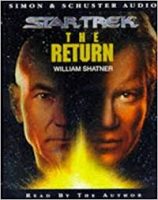
Daniel reviews The Return by William Shatner, Pocket Books, 1996.
“A Mary Sue is an idealized and seemingly perfect fictional character. Often, this character is recognized as an author insert or wish fulfillment. They can usually perform better at tasks that should be possible given the amount of training or experience, and usually are able through some means to upstage the main protagonist of the story, such as by saving the hero.”
(Wikipedia, The Free Encyclopedia)
It’s generally accepted that Star Trek‘s Captain Kirk is pretty awesome. He’s a 1960s Kennedian ideal leading man: punching the bad guys, getting the girls, and giving his friends noogies. An intervening 50 plus years has done a lot to give the character depth, especially through non-canon media like novels, comics, and fan productions. Nonetheless, one of Captain Kirk’s defining attributes continues to be his awesomeness—in both a serious context and with tongue planted firmly in-cheek—and the starship skipper’s most-ardent supporter is unquestionably William Shatner himself.
Shatner’s last canonical portrayal of James T. Kirk was in the 1994 film Star Trek Generations. This feature, intended to be a passing-of-the-torch from the original Trek cast to that of The Next Generation, saw the official on-screen death of Kirk: crushed to death by metal scaffolding. It was generally considered an ignominious end, especially by Shatner himself. What’s a typecast sexagenarian to do? Why not write a novel and bring your character back to life‽
It’s actually pretty good! Foremost to know and be willing to tolerate if you want to delve into The Return: this is Captain Kirk’s world, and the rest of Star Trek is just living in it. The male equivalent of a “Mary Sue” is “Gary Stu”, but given how extraordinarily awesome Kirk is written to be, his could easily be the eponymous name. Be ready for that, and it won’t blindside you and occlude the otherwise excellent writing that flexes a profound knowledge and understanding of Star Trek canon and lore. Secondly, the deus ex machina required to get the ball rolling is a bit eye-rolling, but accept it as the cost of admission, and you’re in for a fun ride.
With The Return, Shatner (and/or co-authors Judith and Garfield Reeves-Stevens) wrote the first Star Trek novels that successfully wove a cross-series tapestry outside of the TV series and films. These weren’t “original series” novels, “Next-Gen” novels, or “DS9 novels”; these skillfully treated the whole of the Trek franchise as a singular, living, breathing universe in which all Star Trek elements—past, present, and future—existed together. The Return takes place just after the run of The Next Generation, allowing for the crossover of those characters with counterparts from Deep Space Nine, Voyager, and the original-series characters previously brought forth from the 1960s— Spock, Dr. McCoy, and Mr. Scott. (Pocket Books would eventually start a similar novel-verse across the franchise, but its first novel in that endeavor wouldn’t be published for four more years.)
A particular kudos to The Return is how Shatner is writing to the sort of fan who picks nits. Many a Trekkie has watched a given Star Trek story and questioned why abilities, tactics, technologies, and/or knowledge seen in previous episodes and films aren’t being used to solve the quandary of the day. The real answer is, of course, plot. Shatner though has made good on the “treknology” of Trek past, and skillfully used it to preempt even moderate grousing of “why didn’t they just…” Examining the novel from such a nick-picky angle feels like the basic story was written, and then run through a gamut of message-board Trekkies over and over until all the major, glaring oversights were rectified and brought into line. It’s immensely satisfying, and feels very much like The Return was written by fans for fans.
The Return is the second of Shatner’s Star Trek novels (the first being 1995’s The Ashes of Eden), but it’s the first one set post-Generations. Add his 1997 novel Avenger, and you get the first “Shatnerverse” trilogy: Odyssey. I really recommend them all, and Ashes is a great start, but The Return holds a special place in my heart, still these 22 years later.






